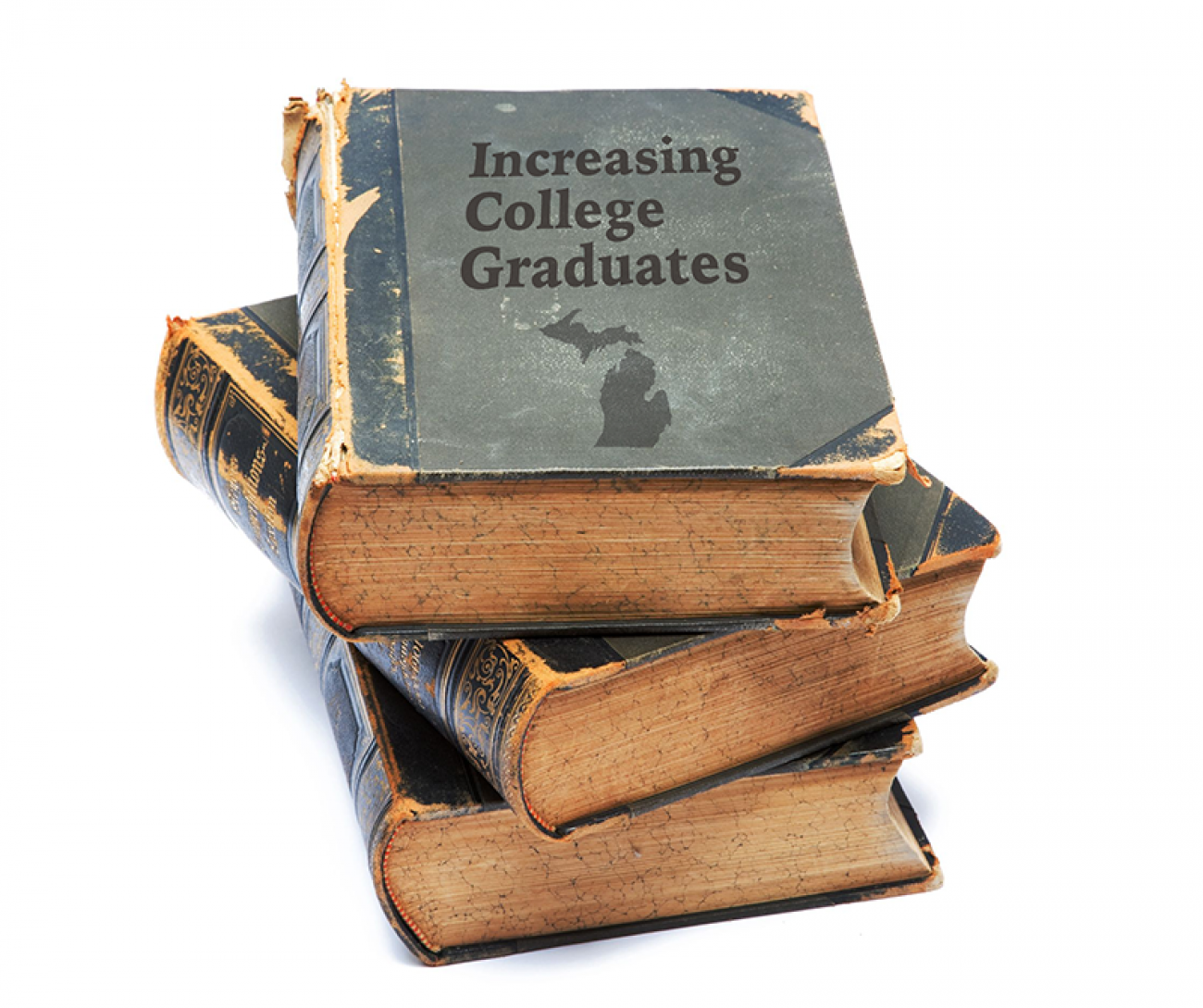Little action in Lansing to increase college degrees

A report released last December offered Michigan a roadmap for how to boost the education and skill levels of its residents.
What’s happened since is more like a roadmap for how to ignore reports.
The exhaustive study, completed by Michigan education, business and advocacy leaders, as well as government officials from both parties, “Reaching for Opportunity: An action plan to increase Michigan’s postsecondary credential attainment,” called for a half-billion-dollar infusion of state cash to get more students to finish college or other programs after high school, which experts say would boost the state’s economy.
But nearly a year later, little or no additional state funding can be traced to the report’s funding recommendations, and the only bill related to a policy recommendations is bottled up in a Senate committee.
“I’m frustrated,” said Brandy Johnson, executive director of the Michigan College Access Network, who helped draft the 2015 report. “I’m frustrated that the legislature hasn’t taken on more of the agenda, particularly as it relates to financial student aid.”
The 64-page report paints a portrait of a state twiddling its thumbs while being passed economically by other states with higher percentages of adults with a post-high school degree or credential.
PREVIOUS COVERAGE: “Sink or Swim: Higher education is key to Michigan’s future.”
The report called for Michigan to more than triple student financial aid, from the current $105 million per year to $480 million. Michigan students currently pay the sixth-highest average tuition to attend four-year public universities in the nation, while the amount of state financial aid Michigan provides students ranks 41st in the U.S. For example, Minnesota spends $736 in financial aid per student, compared with $233 spent by Michigan. (About 31 percent of Minnesota adults have a bachelor’s degree, compared with about 24 percent of Michigan residents).
Financial aid was not increased in the state budget passed by the Legislature and signed by Gov. Rick Snyder this past spring, which was the budget cycle following the release of the report.
The only policy recommendation made in the report that made it into the Legislature is a bill that would require high school counselors to receive 25 hours of training in college prep and selection. House Bill 4552 passed the House in January, but has been sitting in the Senate Education Committee without a vote for eight months.
PREVIOUS COVERAGE: “Education leaders agree: High school students need better counseling”
“There’s a lot of policy recommendations (such as the counseling bill) that wouldn’t cost much at all,” said Johnson, whose group promotes post-high school degrees or credentials for Michigan students.
Rep. Sam Singh, D-East Lansing, House Democratic Floor Leader, also served on the committee, formerly called the Michigan Postsecondary Credential Attainment Workgroup, which produced the 2015 report. (Members are listed here)
“The key to our future is increasing the education attainment of our people at all levels,” Singh said in December when the report was released. “If we fail to do that, we will continue to be a relatively poor state, susceptible to economic swings.”
Nine months later, Singh said he can’t point to any action the Legislature has taken as a response to the report.
“You can’t make a direct correlation” between the report and action in Lansing, Singh told Bridge. “There are a number of things being worked on, such as making it easier to transfer of credits (from community college to public universities) and work on getting more student (college) advising. But when you look at the big ticket items, such as more resources for financial aid, that has not come forward yet.”
Tonya Schuitmaker, R-Lawton, who chairs the state Senate’s Higher Education Appropriations Subcommittee, also helped produce the report. In an email response to questions, Schuitmaker did not list any legislative actions spurred by the report, but wrote, “We remain committed to reinvestment in our universities and our efforts to hold them accountable for their spending. In the last five years, state support for higher education is up, tuition restraint has held costs down, and graduation rates are improving.
“A college degree is one important path to a successful career, but it is only one of many,” Schuitmaker added. “I have been a strong supporter of improving career and technical education to prepare our students for the high demand jobs of a tech-based economy.”
Mike Hansen, president of the Michigan Community College Association, said “it was great that the report put more emphasis on the issue (of college access and completion), but I can’t think of anything that has happened legislatively because of the report.”
Schools say they are acting
Outside of Lansing, though, colleges and universities are implementing some of the report’s recommendations, Hansen said.
Community colleges and four-year public universities are working more closely to simplify credit transfer. And college advisors, through the AdviseMI program run by the Michigan College Access Network, are being placed in rural and low-income schools across the state to provide the type of college guidance that school counselors often don’t have time to provide. Both efforts predate the Reaching for Opportunity report, but have grown since its publication.
A web portal operated by Michigan Higher Education Partnership, a group that includes some of the state leaders who produced the report, called KeeplearningMichigan.com, offers potential college students and their families links to college and career information.
The report also has helped reframe policy discussion in Lansing, even if those discussions haven’t yet led to new state investment, said MCAN’s Johnson.
“It’s baby steps,” Johnson said. “It’s changed the tone and rhetoric in Lansing. People are starting to realize that in order to land a job in Michigan, a high school diploma won’t cut it.”
Michigan Education Watch
Michigan Education Watch is made possible by generous financial support from:
Subscribe to Michigan Education Watch
See what new members are saying about why they donated to Bridge Michigan:
- “In order for this information to be accurate and unbiased it must be underwritten by its readers, not by special interests.” - Larry S.
- “Not many other media sources report on the topics Bridge does.” - Susan B.
- “Your journalism is outstanding and rare these days.” - Mark S.
If you want to ensure the future of nonpartisan, nonprofit Michigan journalism, please become a member today. You, too, will be asked why you donated and maybe we'll feature your quote next time!


 Lansing hasn’t shown much interest in a report outlining recommendations to increase college access and graduation rates.
Lansing hasn’t shown much interest in a report outlining recommendations to increase college access and graduation rates. Brandy Johnson of the Michigan College Access Network is frustrated with the lack of state action following a report on increasing postsecondary education.
Brandy Johnson of the Michigan College Access Network is frustrated with the lack of state action following a report on increasing postsecondary education. Sen. Tonya Schuitmaker, R-Lawton, says that a college degree, while worthwhile, is but one path to a successful career. She notes that training and jobs also exist in Michigan for those interested in career and technical education.
Sen. Tonya Schuitmaker, R-Lawton, says that a college degree, while worthwhile, is but one path to a successful career. She notes that training and jobs also exist in Michigan for those interested in career and technical education.
